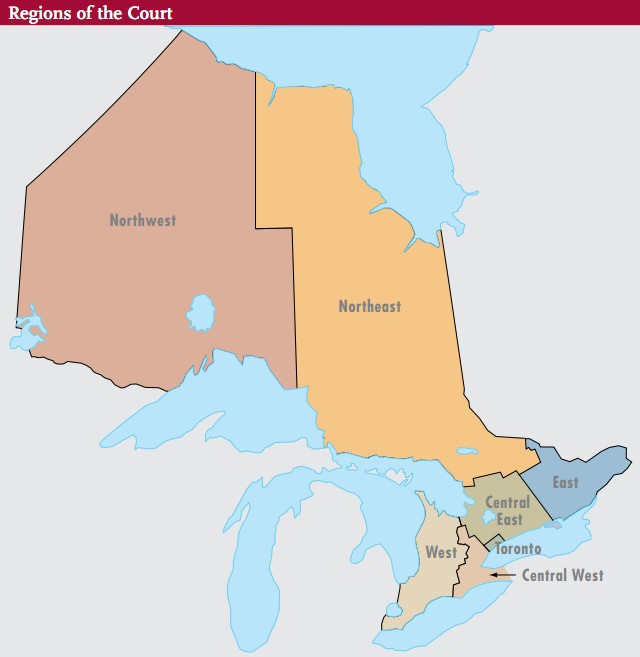The Court - Overview
The Ontario Court of Justice serves the people of Ontario by providing independent, fair and accessible justice.
The Ontario Court of Justice serves the people of Ontario by providing independent, fair and accessible justice. The judges and the justices of the peace of the Court preside over adult criminal, youth criminal, family law, child welfare, and provincial offences matters, in accordance with the jurisdiction set out by municipal, provincial and federal laws.
The Ontario Court of Justice is one of two trial courts in Ontario (the other being the Superior Court of Justice) that make up the Court of Ontario.
The Ontario Court of Justice is composed of provincially appointed judges and justices of the peace. Justices of the peace have jurisdiction with respect to provincial offences matters, including trials, most bail hearings, search warrants, criminal case-management court and hearing applications for peace bonds (section 810 of the Criminal Code of Canada). Judges of the court also hear bail hearings, but also have jurisdiction over youth and adult criminal preliminary hearings, trials and sentencings, some Provincial Offences trials and a broad range of family law and child protection applications and hearings. Almost all criminal charges commence in the Ontario Court of Justice.
Related information
For further general information about the Court, please see the
Information regarding the jurisdiction, structure and organization of the Ontario Court of Justice can be found in:
Principles of Judicial Office
A strong and independent judiciary is indispensable to the proper administration of justice in our society. The judiciary of the Court must be free to perform their judicial duties without fear of reprisal or influence from any person, group, institution or level of government. In turn, society has a right to expect those appointed as judiciary to be honourable and worthy of its trust and confidence.
The judiciary of the Ontario Court of Justice recognize their duty to establish, maintain, encourage and uphold high standards of personal conduct and professionalism so as to preserve the independence and integrity of their judicial office and to preserve the faith and trust that society places in the individuals who have agreed to accept the responsibilities of judicial office.
Principles of judicial office are established for Ontario Court of Justice judiciary. These Principles may assist members of the public to understand the reasonable expectations of the judiciary in the performance of judicial duties. These Principles can be found as follows:
Structure of the Court
The Chief Justice is responsible for directing and supervising the sittings of the Court throughout the province and for assigning its judicial duties.
The Chief Justice is responsible for directing and supervising the sittings of the Court throughout the province and for assigning judicial duties.
The Associate Chief Justice and the Associate Chief Justice-Coordinator of Justices of the Peace assist the Chief Justice in the administration of the Court.
In addition, regional and corporate administrative judiciary assist in the operation of the Courts. Administrative judiciary include Regional Senior Justices, Regional Senior Justices of the Peace, Senior Advisory Family Judge, Senior Advisory Justice of the Peace, Senior Justice of the Peace, Senior Indigenous Justice of the Peace, Local Administrative Judges, and Local Administrative Justices of the Peace,
For more on the structure of the Ontario Court of Justice, please see the Court’s Biennial Report.
Judicial administration regions
Ontario is divided into seven geographic regions for judicial administration. Each regional senior judge is responsible for exercising the powers and performing the duties of the Chief Justice within his or her region, subject to the authority of the Chief Justice of the Ontario Court of Justice. The regional senior judge also assists in the supervision of the justices of the peace within that region. This is done in consultation with the Associate Chief Justice-Coordinator of Justices of the Peace and the regional senior justice of the peace. Across the province, local administrative judges and local administrative justices of the peace assist the regional senior judges and regional senior justices of the peace, respectively.
